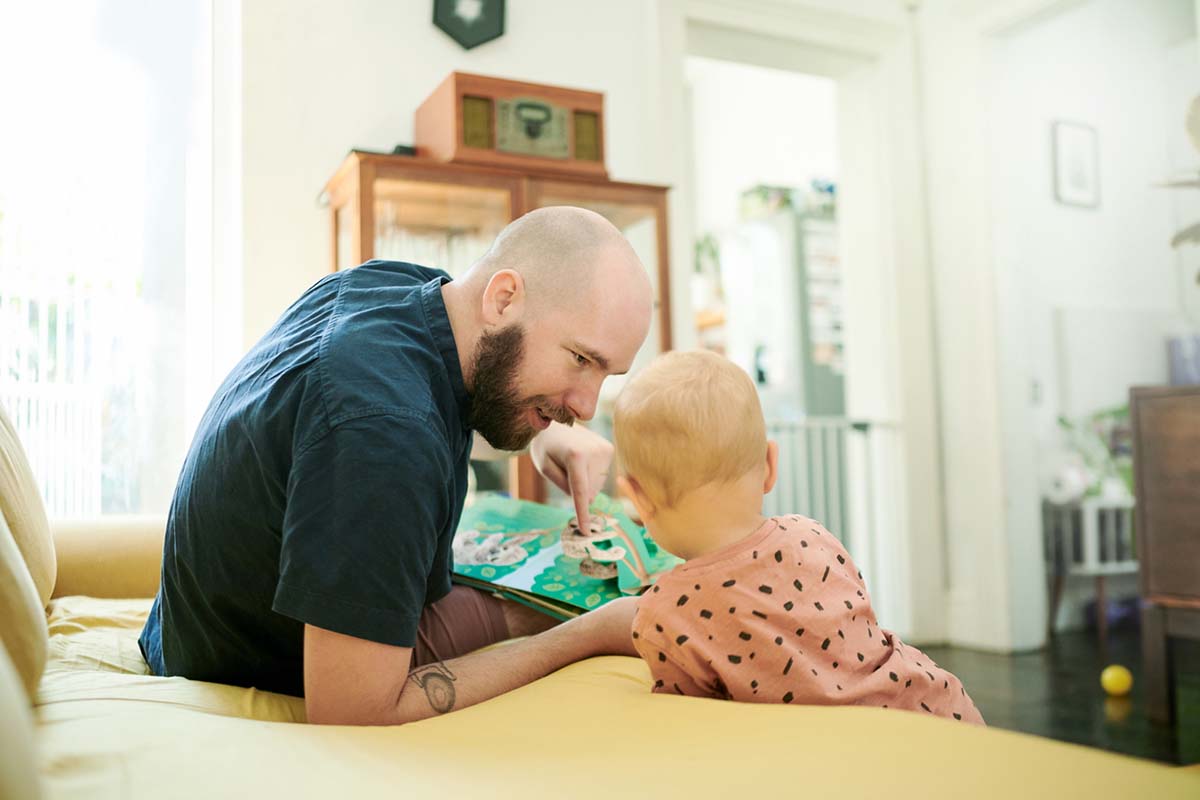Can You Teach a Toddler to Read Before Kindergarten?

As parents, we want to do our best to prepare our children for their future. Reading skills are crucial for brain development, increasing vocabulary, literacy skills and reading comprehension. It’s also a fun way for kids to immerse themselves in a storybook without leaving the home.
While most kids learn to read around the time they start kindergarten, some parents are feeling guilty and confused that their child is entering elementary school without knowing how to read. Can we teach a child as young as a 2-year-old to read?
This article clarifies misinformation about teaching toddlers to read and provides signs, benefits and tips about when children are ready to learn this important skill.
Related: 10 Tips for Reading Aloud to Babies for Brain Development
We spoke with Spencer Russell, founder of Toddlers CAN Read for his expert insights on early literacy innovation.
Spencer has over 1.6M followers on social media and is super popular with TikTok parents. He taught his son to read at 18 months and is enabling parents to do the same. His YouTube short on why his 4-year-old son can read has over 100M views!
Signs Your Toddler Is Ready To Learn To Read
If you’re wondering whether your child is ready for this important milestone, Spencer suggests that you watch for these four big signs that you should teach your toddler to read before kindergarten.
1. Oral Language: Can your toddler pronounce the sounds?
Learning the sounds the letters make is one of the first steps for beginners to learn how to read. After all, reading is primarily about combining letter sounds together to make words. And in order to learn the sounds the letters make, it’s helpful to be able to pronounce those sounds that you’re learning.
There are of course ways to practice letter sounds without saying them (e.g., identifying a sound or pointing to a sound), but it is much easier for children to be able to learn letter sounds when they are able to physically produce those sounds on their own.
Plus, strong oral language skills are critical for almost all areas of reading. Parents should definitely focus on oral language before focusing on reading. Reading aloud to babies and toddlers is a great way to help them get familiar with the sounds of different words and letters.
2. Memory: Can your child remember basic objects from day to day?
Learning the sound a letter makes is no different than learning the sound a cow makes.
If a toddler can look at a picture of a cow and answer the question, “What sound does it make?” that child can also look at a picture of a letter name and answer the question, “What sound does it make?”.
This ability to recognize and manipulate individual sounds in spoken words is called phonemic awareness. There are many toddler phonics games and early reading activities that can help kids 2-year-olds to 5-year-olds start associating different speech sounds and letters.
So, when we evaluate whether a child is ready to learn their letter sounds (assuming they are able to pronounce those sounds), what we are really looking for is whether they’re able to learn and remember the names of other basic objects (colors, shapes, animal sounds and objects) from one day to the next.
If they have strong memorization, there is a good chance they’ll be able to remember the letter sounds as well.
3. Focus: Do you believe they can pay attention to lessons?

It’s important for parents to ask themselves if they think their child has the attention span to learn to read. That's because our beliefs as parents really matter.
Spencer believes that every child is capable of learning how to read, but he wanted to emphasize that he’s not the one teaching them. We are.
He will often tell parents that whether they think they can or can’t — they’re right. Our actions follow our beliefs.
So, if we believe our kids can pay attention to the lesson (they don’t need to be sitting or still - just focused!), then we can continue to adjust how we play with those letter sounds until we find something that works for them!
4. Desire: Do you want to teach reading at home?
This is a big one. Because if parents don’t want to teach their children how to read, then it doesn’t matter if they’re ready or not.
Toddlers don’t need to learn how to read before preschool or kindergarten. So parents don’t need to feel pressure to do something that we genuinely just aren’t that interested in.
But when it comes to reading readiness (after the child is able to pronounce the sounds and remember basic objects from day to day), a huge part of this comes down to you as the parent.
Do YOU want to get started with them?
Pros and Cons of Teaching Your Child To Read Early
We asked Spencer about the benefits of teaching toddlers to read early.
He first wanted to clarify that he would never tell someone they need to or even should teach their child to read early. He explained that it’s an incredibly personal decision that only the parent can make.
Benefits of Early Reading Instruction
However, he shared with us some common reasons he’s heard from parents about teaching early reading to their kids:
- The parent wants to build on the child’s interest in letters or books
- The parent wants the child to be able to learn new words and familiar topics, independently
- The parent wants the child to learn how to read the right way (vs. memorizing or guessing)
- The parent struggled to read growing up and wants to give their child a better experience
- The parent had a love of reading growing up and wanted to give their little one a similar experience
Are There Cons of Early Reading Instruction?
In short, no.
We asked Spencer if there were any risks to teaching our children to read early.
He explained while there are some studies suggesting that teaching young children to read the wrong way may be harmful (e.g., drill and kill worksheets, long lists of sight words to memorize), there is no harm in teaching a child to read before elementary school if the instruction is developmentally appropriate and rooted in the Science of Reading.
He further elaborated that there is a significant body of research suggesting the opposite. This means there is the potential for long-term harm (poor grades, fewer opportunities, low confidence, and low self-esteem) when we try to teach children how to read too late.
Tips and Resources To Help Parents Start Teaching Toddlers To Read
If you’re looking to set your child up for reading success, Spencer gave the following advice and resources.
1. Set realistic early reading goals

This isn’t about sending your kid to Harvard (at least, it shouldn’t be). And this isn’t about showing off on social media.
Think of the kinds of experiences and opportunities you want your child to have in their life. Think about the kind of person you want them to be and how they’ll interact with the world.
If learning to read early is going to help them achieve those goals, have access to the opportunities or build those characteristics, then go for it!
But if you look at all of those things and decide that learning to read early would not help them, then don’t do it! This isn’t a competition so really think about this and do what you think is best for your little one.
2. Take some time to learn about reading
Just because you learned the letters of the alphabet by singing the ABC song or memorizing lists of sight words doesn’t mean that’s the best way to teach your little one.
Oftentimes, we were taught poor reading strategies that made the process more difficult and less fun than it needed to be.
Helpful Resource: 30-Minute Free Beginning Reading Program Workshop to help to streamline your learning process.
3. Play games with the letter sounds
You can hide letters around the house and have them say the sounds when they find them. You can set the letters on the ground and have them jump onto each sound as you say it. You can hold up letter flashcards, and let them punch them out of your hand while they repeat the letter sound back to you.
Just make it fun for them!
As a general rule of thumb: you can take almost any game, activity, toy, or stuffed animal and make it into a reading lesson if you spend a few minutes thinking about it.
4. Practice blending sounds together in words
After your child knows the letter sounds, they’re going to need to be able to combine those sounds together to make words. We call this skill “blending”.
You can practice blending anytime, anywhere by saying sounds out loud with a space between them (e.g., “A-T”) and asking your little one to tell you what word it makes (e.g., “AT!”).
You can also practice blending written down with a whiteboard and marker. In the beginning, this is a tricky skill to teach.
Remember to stay patient! Because with consistent practice, this will become second nature to them (just like it is for us) and they’ll be blending/reading everything in sight.
5. Believe in your child

This is by far the most important piece of advice. You have to believe in your child. We live in a society that often trivializes what kids are capable of and rewards negative assessments of our child’s abilities.
But when it comes down to it, the way that we think about our own children and the way that we speak about our kids impacts the way that we act toward our kids. And whether we think we’re hiding it or not: our kids can tell whether we truly believe in them or if we’re simply going through the motions.
And yes, your belief in your child will help the reading time and it will help them learn to read faster. It always does.
But it goes much deeper than reading.
Whether you choose to teach your child to read or not: maintaining the belief that they are capable of not just learning how to read but learning how to do anything else they put their mind to is much more important than the age your child reads their first word.
More About Our Expert: Spencer Russell
Spencer Russell is a global leader in literacy innovation and the founder of Toddlers CAN Read, a groundbreaking program that has helped thousands of children master the art of reading. With over a million supporters on social media, Spencer is widely recognized as an outstanding educator who has received widespread acclaim for his contribution to the teaching profession within his city, state, and national charter network.
After successfully teaching his 18-month-old son to read in just six months, Spencer left a comfortable six-figure salary in education to pour all his expertise, research, and resources into creating Toddlers CAN Read.
He firmly believes that early literacy can be a game-changer for children navigating the challenges of the educational system, and he is resolutely committed to making sure no child gets left behind. Spencer is a big-hearted family man who leads by example. His steadfast mindset, strict self-discipline, passion for lifelong learning, and deeply held conviction that every child deserves the best start in life have propelled him to success.
Toddlers CAN Read is Spencer’s enduring legacy, reaffirming his status as an influential figure in American education.

